#and mauritania is my favorite name for a country
Text
GULF ARABIC
!السلام عليكم
First, I'd like to thank everyone for 50 followers! Please keep sharing these posts and feel free to suggest a language or ask a linguistic question!
As the FIFA World Cup progresses through the knockout stage, I'd like to take a dive into the dialect of Arabic spoken in the host country, Qatar.

Arabic as a language is a very broad umbrella encompassing a wide array of dialects spoken from the Maghreb (Morocco, Algeria, Mauritania, etc. -- the term "Maghreb" (الْمَغْرِب) literally means "the west") to the Arabian Peninsula, and from the Horn of Africa to the Levant. Gulf Arabic, the focus of today's profile, is spoken on the western and southern shores of the Persian Gulf, and to a lesser extent, on the northeast shore. According to Glottolog, Gulf Arabic can be classified as part of the North Arabian Bedouin Arabic set of dialects, part of the Peninsular Arabic branch of the Arabic family. Ultimately, it is a Central Semitic language, the same branch of languages that is home to Hebrew, Phoenician, Ugaritic, Aramaic, and a host of other languages originally native to the Middle East.
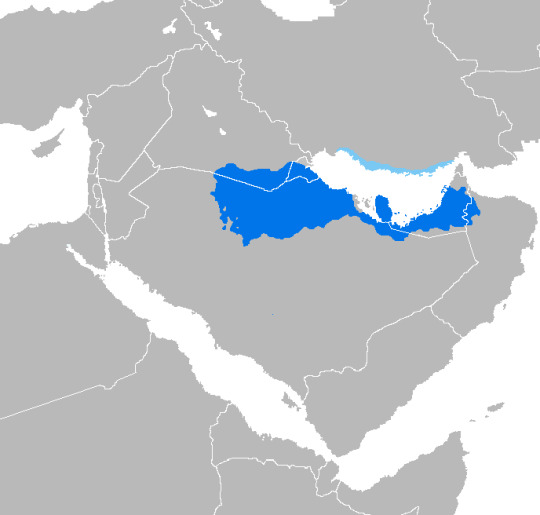
Gulf Arabic is spoken by about 10.6 million people (both natively and as a second language), mostly in the Gulf region but also in diaspora. Known locally as "Khalījī" (roughly, "of the Gulf"), this dialect has several features that distinguish it from its dialectal neighbors and from Modern Standard Arabic (MSA, or al-Fuṣḥā - the language of most literature, media, and practically anything else across the Arab world besides vernacular, colloquial Arabic).
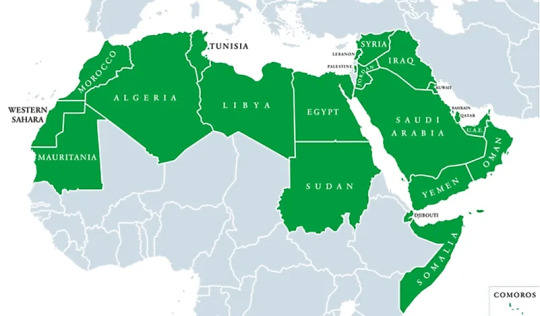
Before we dive into particulars, let's take a look at the name, "Qatar". A direct borrowing from Arabic "قَطَر" ("qaṭar" transliterated into the Latin script), it's quite often mispronounced* in English-language media. The Gulf Arabic vernacular pronunciation of the nation's name can be represented in IPA (International Phonetic Alphabet, a.k.a. one of my favorite things) like so: [ˈɡɪtˤɑr]. For the uninitiated, imagine saying the English word "guitar" with emphasis on the first syllable. In the video at the beginning of >this article<, the host uses more of a Modern Standard pronunciation, as evidenced by the initial consonant and vowel ("qa" as opposed to "gi").
*However, if someone says something and they mispronounce it or it's not technically a word and you're still able to comprehend what they're trying to say, I say leave it be! It's the polite thing to do, after all.

The Arabic language originated perhaps as far back as 800 BCE somewhere in the northwestern part of the Arabian Peninsula. Some dialect of Arabic (though certainly not as differentiated as today's Khalījī) was already spoken in Qatar by the time Muhammad sent Al-Ala'a Al-Hadrami (العلاء بن الحضرمي) to spread the message of Islam to the area in 628 CE (6-7 AH) (note: it is customary within Islam to follow the Prophet Muhammad's name with an honorific, which this website explains a few of). (If anything in this paragraph is incorrect or disrespectful, please let me know!)
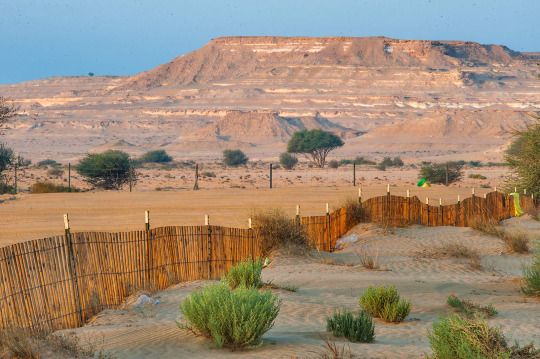
As the centuries passed, empires and caliphates rose and fell. Control over the peninsula changed hands several times well into the modern period. Qatar declared independence from - gasp! - Great Britain only on September 3, 1971, and it had previously been under the control of the Ottomans, Saudis, Persians, and many other dominant regional powers.
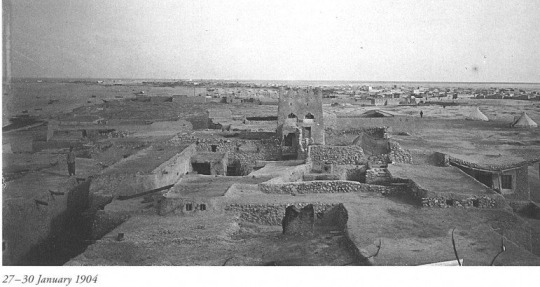
Owing perhaps to such a tumultuous regional history, Gulf Arabic's phonology has made some notable shifts away from Classical Arabic (the basis for MSA). Due to influence from an influx of foreign workers (particularly from South Asia), a foreign "p" sound has entered the dialect that distinguishes itself from the "b" sound, an expressly non-native phenomenon requiring a modified letter. Remember that "g" sound in "Qatar" from earlier? This is another of the more visible phonological shifts - though depending on the speaker, some may realize this sound like a Persian "q" (something like a "g" but pronounced back by the uvula), a French "r" (you know the one), an English "g" (phew!), or even like a Classical Arabic "q" in some instances.
I have not personally attempted to learn Gulf Arabic, so I can't give my recommendation on any particular learning apparatus over any other, although this website has a few potential paths to proficiency. However, if you find yourself in Qatar for business or pleasure, you may or may not be pleased to find that English is quite commonly spoken among native Qataris, owing to the nation's recent colonial past with Great Britain.
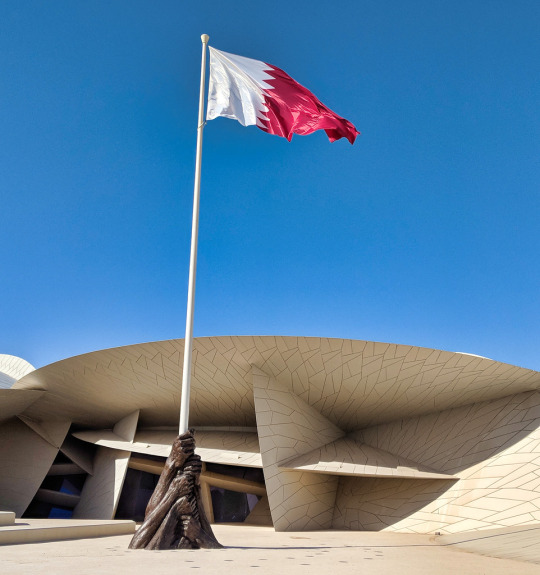
I would also like to make mention of a hidden gem you may have noticed within this World Cup's logo: the "t" in "Qatar" is quite stretched.

This "stretchy letter" phenomenon is known as "kashida", a borrowing of the Persian "kešide" (کشیده), which means "long" or "weighted" (or, in this instance, "extended"). It can be used for various purposes, such as emphasis of pronunciation or meaning, or as an effort by a calligrapher to fill extra blank space. In many stylized calligraphic texts written in Arabic and its descendant scripts, kashida is perhaps one of the more recognizable techniques utilized, even to someone with no knowledge of what is written.
Here's a link to some Gulf Arabic greetings complete with sound files. Even making the effort to learn some of these will go a long way in opening new doors to you!
Here's a playlist of music by Qatari artists! Listen to the sounds of the Gulf.
I understand this post is quite Qatar-centric, but if you're interested in hearing more about the history and culture of the other areas where Gulf Arabic is prominent (Kuwait, UAE, etc.) let me know and I'd be more than happy to talk about them!
What language would you like to see me profile next? Comment or send me a message! Please follow, share, like, and reblog for more linguistics!
#Afro-Asiatic#language#linguistics#culture#langblog#langblr#languages#arabic#arab#qatar#qatari#persian gulf#fifa 2022#world cup#fifa world cup#sports#soccer#football
10 notes
·
View notes
Note
uh how is the muslim crisis propaganda???
thank you for asking anon! (before we jump into this, i just wanna say that this will probably be my only post on this blog about this topic bc while i’m a very political person, i usually like to keep this blog cnco-focused. that being said, if you have any further questions after reading this whole post and all the materials linked, please let me know!)
as i write this, i want you to know my intention: my intention in writing this is not to tell you what exactly to believe, or to convince you that my view is unequivocally correct. my goal is to shed light on why having a critical analysis lens is so important, especially if you live in the west.
this is probably going to raise a lot of feelings for folks, as it should: human rights abuses are no joke. they are horrible and disgusting and real ones that occur need to be corrected and justice must be served. that being said, the re-education centers located in Xinjiang are not centers of torture or abuse, as western media would have you believe.
i think the first step to answering this question is discrediting the vast majority of western news sources, especially the extremely popular ones. even the ones that are supposedly the least biased still reek of imperialism and often times racism/xenophobia/anti-semitism/etc. for example, i have seen the New York Times and the BBC make several claims about the “concentration camps” occurring in china with little to no material basis for their claims beyond one or two individual people (which like...y’all know people can be bought, right?). i want to draw your attention to the validity of these news sources. these news sources continuously side with imperial powers and politic when publishing articles they claim to be “fact.” for example, the NYT and BBC have both supported the coup in Bolivia, describing it as “restoring democracy” and have gone so far as to twist the story to make Evo Morales some sort of evil dictator (which is so far off base idk how even to link articles in this case just google it dude it’s so gross. la lucha sigue!!) moreover, the NYT continually makes a case that there are always two right sides to an argument, and the truth lies somewhere in between. they especially like to make this case when it comes to US politics and Trump supporters (and let’s be very clear: if you’re a trump supporter you’re not a good person)
so, going forward with the assumption that the vast majority of western news sources are biased towards capitalism and imperialism (even tho i only named two here), we can begin to question the validity of the claims that china is keeping Uyghur Muslims in concentration camps. in order to do this, let’s take popular western media off the table completely. you may think that doesn’t leave us with much to go off of, but in reality it opens a completely new door for us to examine.
one of my favorite news sources for critical investigative journalism is called the Grayzone Project. they often do investigations into whether or not popular western media is spewing fact or propaganda (hint...it’s usually propaganda). They did a piece on this topic when these claims first started coming out, and I think it’s a super good jumping off point for this discussion: https://thegrayzone.com/2018/08/23/un-did-not-report-china-internment-camps-uighur-muslims/
now maybe after reading that report, you still think i’m full of shit. fair enough. but grayzone are not the only people to do reporting on topic. Global Times has also written about this, and these are two of the articles I found to be most poignant:
http://www.globaltimes.cn/content/1168472.shtml
http://www.globaltimes.cn/content/1170249.shtml
I’d love to unpack the first article a little more. Namely, pay attention to where the visiting reporters were from: Egypt, Oman, United Arab Emirates (UAE), Union of Comoros, Lebanon, Mauritania, Sudan and Tunisia. These nations have majority Muslim populations, or at the very least a significant population of Muslim folks residing there. this was not done by accident: the chinese government wanted to show these countries that they were not abusing their people. they were very open and honest about the situation as it stands, and the representatives from these countries were pleased. moreover, these reps were grateful, as the extremist, terrorist education that occurs in Xinjiang by terrorist organizations has been deadly.
What’s more, China has actually invited the UN into it’s country to see these centers for themselves (this is an article by TeleSur, another really good news source imo): https://www.telesurenglish.net/news/China-Invites-UN-to-Visit-Education-Centers-in-Xinjiang-20190613-0004.html
Logistically speaking, when a country is committing cultural genocide or apartheid, they don’t invite the UN or other human rights organizations to come take a quick peak (cough cough Israel cough cough).
Moreover, the UN isn’t moving in on China for a reason: there is nothing to move in on. It’s not like the UN is ignoring the plight of the Uyghur Muslim people, but rather there is no genocide occurring to bring to justice.
Now even after all that, maybe you still don’t understand WHY western media would propagate such hurtful lies with such intensity. To me, the answer seems clearly rooted in capitalism, imperialism, and self-interest. The US currently isn’t in great standings with China or other Muslim majority countries (y’all remember the muslim (”travel”) ban, right?), and it makes sense to me why they would try their very hardest to discredit the nation. If you want a take from someone who’s not a westerner herself, here’s another article: http://www.globaltimes.cn/content/1167645.shtml
Now, maybe after ALL of this, you still think i’m wrong. maybe you’re questioning the validity of my sources or even my arguments. and while i ultimately disagree with you (i think i showed tf up with receipts and also logic), i hope you at least come away from this with a better understanding of why it’s important to be critical of the information we are receiving. every news source has bias; evidently, no one information source lives in a vacuum. but remain critical: are they biased towards imperialism and money? or are they biased towards the truth?
#lmaoooo i just spent like half an hour on this jfc#once again: i probably wont be discussing this further on this blog#but my dm's are always open!!#not-cnco#anon#shit what was my tag#not cnco#maybe that????#bruh idk anymore
13 notes
·
View notes